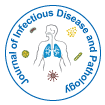Pathogens and their Impact on Human Evolution
Received Date: Mar 08, 2023 / Accepted Date: Mar 30, 2024 / Published Date: Apr 02, 2024
Abstract
Pathogens have played a pivotal role in shaping human evolution by exerting selective pressures that drive genetic adaptations and influence population dynamics. Throughout history, interactions with various pathogens, including viruses, bacteria, and parasites, have led to evolutionary changes in the human immune system and other biological systems. These adaptations have enabled humans to survive and thrive in diverse environments and to resist infectious diseases that pose significant health risks.
The co-evolutionary relationship between humans and pathogens has resulted in a complex interplay of hostpathogen interactions, where each party continuously adapts to the strategies employed by the other. While some pathogens have contributed to the development of beneficial traits, such as genetic resistance to specific diseases, others have posed significant challenges and threats to human survival.
Moreover, the impact of pathogens on human evolution extends beyond individual health to influence social structures, cultural practices, and migration patterns. Epidemics and pandemics throughout history have shaped human societies, leading to changes in behavior, healthcare practices, and population movements.
In the context of modern healthcare, understanding the evolutionary dynamics between humans and pathogens is essential for developing effective strategies to combat infectious diseases, antimicrobial resistance, and emerging viral threats. This includes the development of vaccines, antimicrobial agents, and public health interventions that leverage our knowledge of evolutionary biology to mitigate the impact of pathogens on human health.
Citation: Aleksandar P (2024) Pathogens and their Impact on Human Evolution.J Infect Pathol, 7: 221.
Copyright: © 2024 Aleksandar P. This is an open-access article distributed underthe terms of the Creative Commons Attribution License, which permits unrestricteduse, distribution, and reproduction in any medium, provided the original author andsource are credited.
Share This Article
Recommended Journals
Open Access Journals
Article Usage
- Total views: 619
- [From(publication date): 0-2024 - Apr 16, 2025]
- Breakdown by view type
- HTML page views: 419
- PDF downloads: 200
